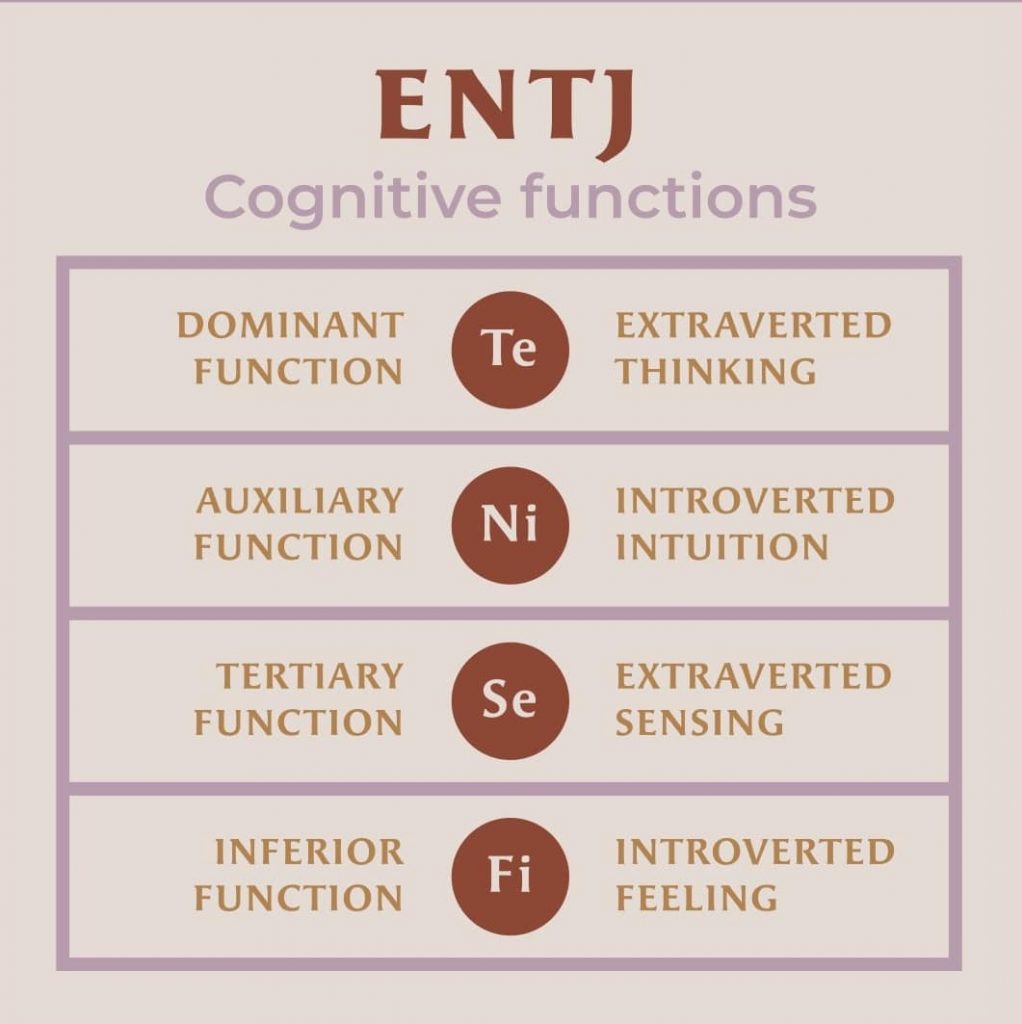ENTJ – The Commander
Contents
ENTJ Meaning:
Known as the Commander personality, ENTJs are comprised of the following personality traits and tendencies, Extraverted, in that they garner and derive their energy from interacting with others and the outside world, Intuition in that they tend to think in terms of possibilities and concepts, Thinking, in that they reason using objective and logical data and analysis; and Judging, in that they approach the world in a controlled, organized, scheduled, and regulated method. The ENTJ is also one of the least common personality types of all of the 16 Myers-Briggs personality types, with only 2 percent of the population reporting in as ENTJ, three percent being men, and only a single one percent being women.
ENTJs can be best described as systematic and rigorous in dealing with and approaching the world. They place an extremely high value on logic, facts, rules, and regulations, and often have little appreciation or patience for grey areas. These traits make for highly effective and illustrious careers; however, with little to no consideration for feelings, paired with the tendency to extraversion, ENTJs can be perceived as uncaring, impersonal, and without compassion. However, ENTJs tend to take feedback exceptionally well and often internalize and address any feedback they can deem as fair or necessary.
ENTJs are at their very core ‘drivers’ – relentless executors who will stop at nothing to achieve any given objective or goal. This may come at the cost of their social relationships, both within interpersonal and professional settings.
ENTJs tend to have little or no tolerance for incompetence and do not restrain themselves from letting their frustration show to those who appear ill-prepared or struggle to follow their logic and method.

ENTJ and Career:
The ENTJ’s personality and approach within the workplace can be perceived as rather polarizing. The ENTJ has a particular disdain for inefficiency and indecision. They would much rather prefer work environments with established rules, procedures, and processes. Also, given their alias as the Commander, it is unsurprising that ENTJs enjoy and actively seek to control any given group or situation. Their tendency towards Extraversion allows them to speak up and argue for what they believe to be the right course of action. Although they do not necessarily have a penchant for politics or diplomacy, they more often than not find themselves as leaders of teams.
ENTJ as Direct Reports:
ENTJs as direct reports appreciate and respond best to clear and straightforward directions. They prefer only to know what is absolutely necessary. If a proper or clear direction is not being provided, they will certainly not shy away from pointing it out and getting the information they need to complete their tasks. As ENTJs are particularly perturbed by incompetence, it can be particularly challenging for a leader of the ENTJ to gain their respect and loyalty, especially if the ENTJ has any reason to believe or suspect that their leader may be incompetent. This can quickly lead to a direct challenge or resistance to authority on the part of the ENTJ that needs to be kept under constant check and supervision.
However, if an ENTJ does indeed have confidence in their leader and their direction, they will exact any given task or goal zealously with the only option being nothing less than unequivocal success.
ENTJs will become locked in and entirely dedicated and focused on their goals or objectives. While they can be trusted delegates of most tasks that need to be completed, the ENTJ may struggle if that task is mainly involved with managing feelings and emotions.
ENTJ as Leaders of Others:
ENTJs prefer to be and, indeed, thrive as being the leaders of others. They are drivers of results and can often realize a goal or objective regardless of the perceived obstacles or resistance that may be met along the way. This tenacity for delivering and executing results has its apparent benefits within any corporate or financial setting. However, this drive and subsequent success may come at the cost of many team members’ feelings and emotions.
Although the ENTJ can indeed be perceived as insensitive, especially to the more Feeling personality types, it does not come from a lack genuine care or concern. Instead, the ENTJ places the highest value, much higher than most, on empirical data and logic. The ENTJ believes that feelings and emotions are fundamentally distinct from the logical order of things, and therefore should not be the primary consideration in any given situation.
Unsurprisingly, given the ENTJ’s tendencies towards Extraversion and Intuition, they can be particularly inspiring, rallying, and gregarious as leaders. However, The ENTJ tends to have little regard, patience, or consideration for the feelings of others when looking to execute any given task or objective. While this may be massively beneficial when applied to the correct field or industry, it can also be just as debilitating and deconstructive in the wrong ones as well.
ENTJs also tend to be much more career-focused than most of the other personality types and place a much larger value and emphasis on profession and their perceived professional success. They rank among the highest for job satisfaction and genuinely thrive in living and bringing their ambition and vision to life. In this respect, ENTJs can run the risk of not maintaining a healthy work-life balance and have the real potential to damage interpersonal relationships in their relentless professional pursuit.
ENTJs are precise and calculated strategists who set and deploy meticulous planning to exact their vision. They set a plan and goals in all areas of their life and often can describe their 5+ year plans in much better detail than most, if not all of the other personality types.
ENTJ Professions:
When it comes to particular occupations or professions, there are few careers that the ENTJ would not excel at. Given their natural affinity towards leadership and & supervising others, they fit exceptionally well within any corporate structure, including, but not limited to, Finance, Insurance, Tax Agencies, Real Estate, Financial Advisors and Meeting Planners.
Also, given the ENTJ’s preference for Extraversion and their capacity to captivate others, Sales is also a common and prominent profession of choice for the ENTJ, including, Advertising Sales, Insurance Sales, Sales Manager or Sales Representative.
And, with their attention to detail and aptitude towards logic and data, ENTJs also tend to do quite well in most Engineering professions.
While the ENTJ has the aptitude and natural tendencies to excel at various occupations, there are also some that they may want to avoid or seriously consider before entering. These include Teaching, most Arts, Social Work, and Administrative Assistance. These are all careers that require great care and patience when dealing with others. This is not to say that the ENTJ would not be successful in these pursuits. However, they may find it challenging or not to be among their top preferences.
ENTJ and Interpersonal Relationships:
ENTJs who apply the same level of effort, confidence, assuredness, and ambition in their personal lives as they do with their careers can make for powerful and meaningful relationships. However, this requires a complete and continued consciousness and effort on the part of the ENTJ. When it comes to compatibility in general, ENTJs work best with personality types that are not overly sensitive or prone to take feedback and differing opinions personally.

ENTJ in Friendships:
ENTJs work best with those who support and have the same values as them. They tend to get along best with other Judging personality types and other individuals who can keep up with their line of thought and reasoning.
These personalities include the INTJ (Introvert, Intuitive, Thinking and Judging), the ESTJ (Extravert, Sensing, Thinking and Judging), the ENTP (Extravert, Intuitive, Thinking and Perceiving), and, of course, fellow ENTJs.
While these personalities tend to be the most compatible, the ENTJ should know common pitfalls, or how others may perceive them in general. The ENTJ tends to dominate social situations and conversations, which may work for some personality types, but may also be a cause of resentment for others. ENTJs struggle the most to develop interpersonal relationships with the Feeling and Sensing personality types, which tend to be the most affected and at odds with their perceived insensitivity. These personality types consist of the ISFP (Introvert, Sensing, Feeling, Perceiving), the ISFJ (Introvert, Sensing, Feeling, Judging), the INFP (Introvert, Intuitive, Feeling and Perceiving), and the ESFP (Extravert, Sensing, Feeling, Perceiving).
ENTJ in Romantic Relationships:
ENTJs prefer to apply the same logic, structure, and order to their romantic relationships as with other aspects of their lives. Therefore, ENTJs work best with a partner that is just as organized, devoted, ambitious, and driven as themselves. It is also essential that regardless of specific personality type, the ENTJ’s partner understands and appreciates the ENTJ’s professional and career ambition.
They will most likely spend the majority of their time and attention on and at work, and this will simply not work for some personality types, eventually becoming a point of contention, frustration, and discontent.
ENTJs will also not shy away from conflict and enter into it with an almost clinical approach, devoid of emotion. The emotion or feelings of their partner become merely another factor for consideration in an overarching equation. They will obsess over and scrutinize this equation until they find what they deem to be the most logical conclusion or solution. As such, their partners may feel unheard and unvalued if they find that their feelings are being ignored on a consistent basis.
ENTJ and Families:
ENTJs are ambitious and have high expectations for not only themselves, but for their families as well. As such, the family’s success is paramount for the ENTJ, and they work to instill these same values in their children.
ENTJs parent by setting very clear rules and expectations that are not to be deviated from, lest they face clearly defined consequences. While this makes for highly competitive, hardworking children, it is vital that the ENTJ also prioritize being emotionally available and receptive of their children.
As with other relationships, ENTJ’s families may find that they are second to the ENTJ’s career, and may become a point of contention for their children as well.
Conclusion:
It is not surprising as to where the title Commander comes from with the ENTJ personality type. They have a forceful and robust approach and are ambitious drivers that place a considerable emphasis on professional and financial success. While they can be highly successful in both professional and personal settings, their style can indeed be polarizing, especially for the more Feeling and perceiving personality types.
They are highly competitive and relentless in their pursuit of success. This competitiveness informs all aspects of their lives, including relationships and family. ENTJs work best with personalities who share this same doggedness and passion with success. However, they may come across as superficial to those who do not place the same value on material, financial, and professional success.
You can find information on famous people with ENTJ personality types such as celebrity actors, sportsmen, characters and other historical characters with this personality type.







